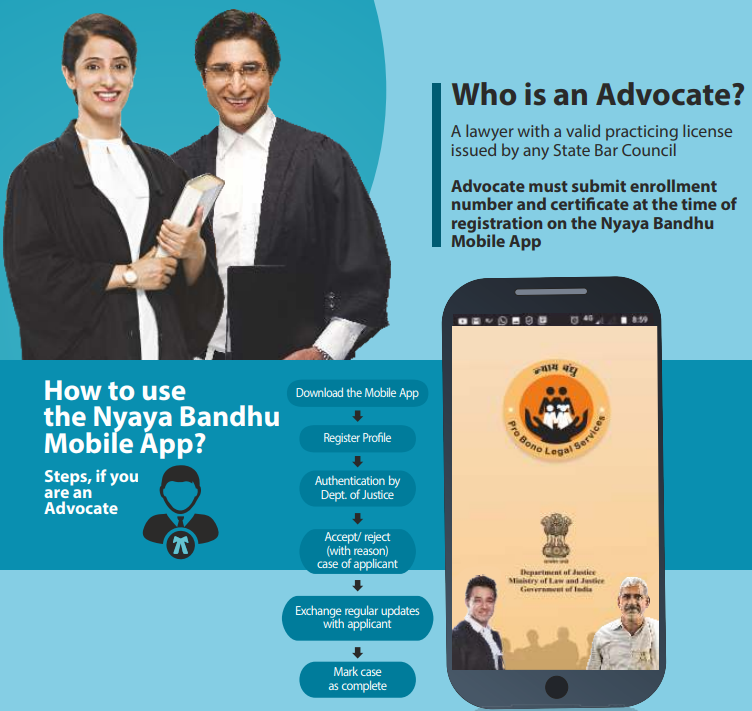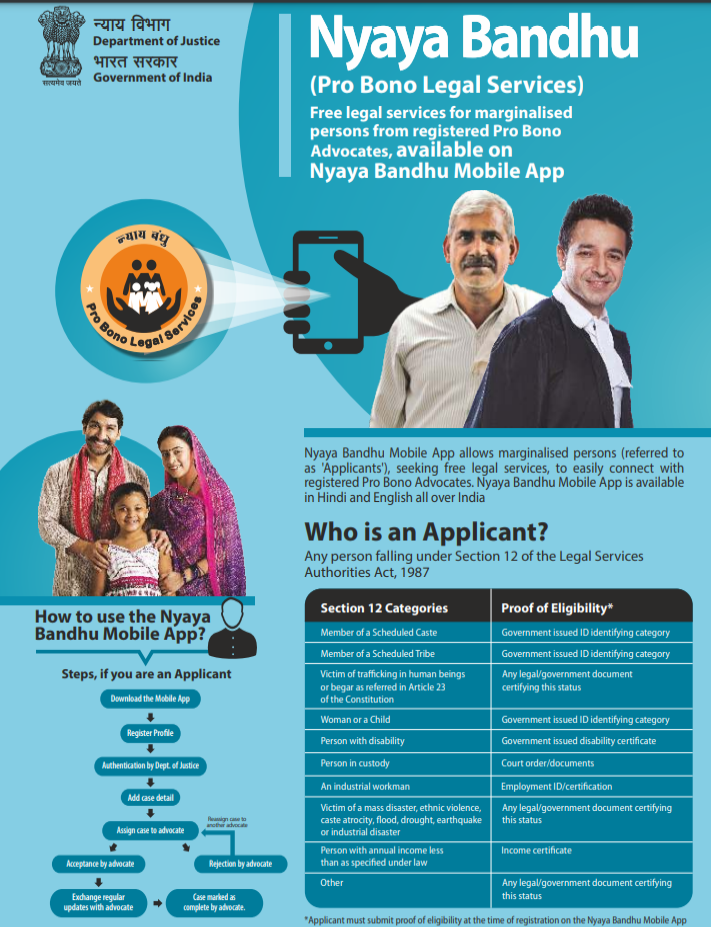Pro Bono legal service
Pro Bono legal service
Free legal aid and services in India is primarily the mandate of National Legal Services Authority and State Legal Aid Services authorities which has a wide presence throughout the country. However, the legal needs of people continue to grow requiring meaningful contribution from the legal community.
The scheme is being offered under the umbrella scheme “Designing Innovative Solutions for Holistic Access to Justice” (DISHA) Scheme launched for a period of five years - 2021-2026 by Ministry of Law and Justice.
Pro Bono legal service
Pro Bono legal service as a concept has not gained much momentum in the country and remains more of an ad hoc, individualized practice lacking an institutional structure.
Pro Bono comes from the Latin expression "pro bono publico" meaning "for the public good". Many lawyers provide poor and underprivileged clients with valuable legal advice and support without seeking any professional fee. Unfortunately, this laudable tradition of public service has not received any deserving recognition. In many countries pro bono legal support has emerged as the dominant means of dispensing free representation to poor and underserved clients.
The Constitution of India by virtue of Article 39 A directs the State to provide free legal aid to the poor and weaker sections of the society, to promote justice on the basis of equal opportunity. Further, Article 14 and 22 (2) of the Constitution ensures equality before law. Also, the United Nations Sustainable Development – Goal 16 underscores the obligation of States 'to ensure equal access to justice for all'. Keeping in line with these obligations and with a view to encourage pro bono legal services the Department of Justice (DoJ) intends to create a database of lawyers willing to provide their services to litigants identified under Section 12 of The Legal Services Authority Act of 1987.
Objectives
- To encourage lawyers and legal professionals to provide pro bono legal services
- To recognize pro bono legal work being provided by lawyers and legal professionals
- To create a database capturing vital information of lawyers for appropriate positions in the relevant field
Scope
Creation of the database will assist the Department of Justice in identifying lawyers providing pro bono services. The information could be utilized by DoJ to create a liaison between entitled to legal services under The Legal Services Authority Act, 1987 and a qualified lawyer providing pro bono services having expertise or interest in the related matter. The government has also proposed to include and recognize pro bono legal assistance provided by lawyers as a yardstick to be considered for appointment to appropriate positions. The database therefore will act as an additional tool for the authorities to assess pro bono services provided by lawyers.
How to access the services
Lawyers/Advocates
 Eligibility of lawyers and legal professionals to register for the service
Eligibility of lawyers and legal professionals to register for the service
- Has enrolled with a Bar Council
- Has been practicing as an advocate at the Bar
- Age is no bar for creating a profile for pro bono
- Those between 44-54 years of age will be provided the option to provide additional information if interested to be considered for appropriate positions.
How to Register?
- The applicant must be registered with ServicePlus. If you already have a service plus id you can login with the same to register for pro bono.
- If you do not have a ServicePlus id, fill in the online registration form. To access the form, click here.
- Kindly read the terms and conditions before filling in the form. After registration you can login to create a profile for pro bono.
- You would be required to furnish proof of birth (eg. birth certificate or 10th/12th mark sheet)
Citizens
 Who is eligible to apply for legal help
Who is eligible to apply for legal help
Beneficiaries or Applicants, in order to avail the benefits under this programme must belong to one of the categories mentioned under Section 12 of The Legal Services Authority Act of 1987. These include:
- Member of a Scheduled Caste
- Member of a Scheduled Tribe;
- Victim of trafficking in human beings or begar as referred in article 23 of the Constitution;
- Woman or a Child;
- Person with disability;
- Person in custody;
- An industrial workman;
- Victim of a mass disaster, ethnic violence, caste atrocity, flood, drought, earthquake or industrial disaster;
- Person with annual income less than as specified under law;
- Other.
Registration
- Citizens can register for the service using the following
- UMANG service portal;
- Nyaya Bandhu portal
- Mobile app - For android platform ;
- Once the user profile has been approved by Department, user can add the details of their case, by clicking on pro bono logo on Home screen and then clicking 'Add Case' link on top right corner of 'Applicant Cases' page.
- Allocation of cases - A case registered by an applicant is assigned to an advocate based on matching of two parameters
- Area of practice/Category of Case – Civil or Criminal
- Court of Practice/Court where case is pending – Name of Court< /li>
- This matching is done automatically through sifting of database of advocates stored under the programme.
- User will now, either be directed to 'Assign Advocate' page with list of advocates reflected based on a search accustomed to your case details OR in some cases, notified that an advocate will be assigned to your case by the Department.
- Once the added case has been accepted by an advocate the case details will reflect under 'Ongoing Cases' on 'Applicant Cases' page. Here the user can exchange regular updates with the assigned advocate.
- The assigned advocate may, when he is duly satisfied, mark your case as completed, once a final order has been made by the court.
Last Modified : 12/16/2022
Provides information about Designing Innovative So...
Provides information about Support to Poor Prisone...
